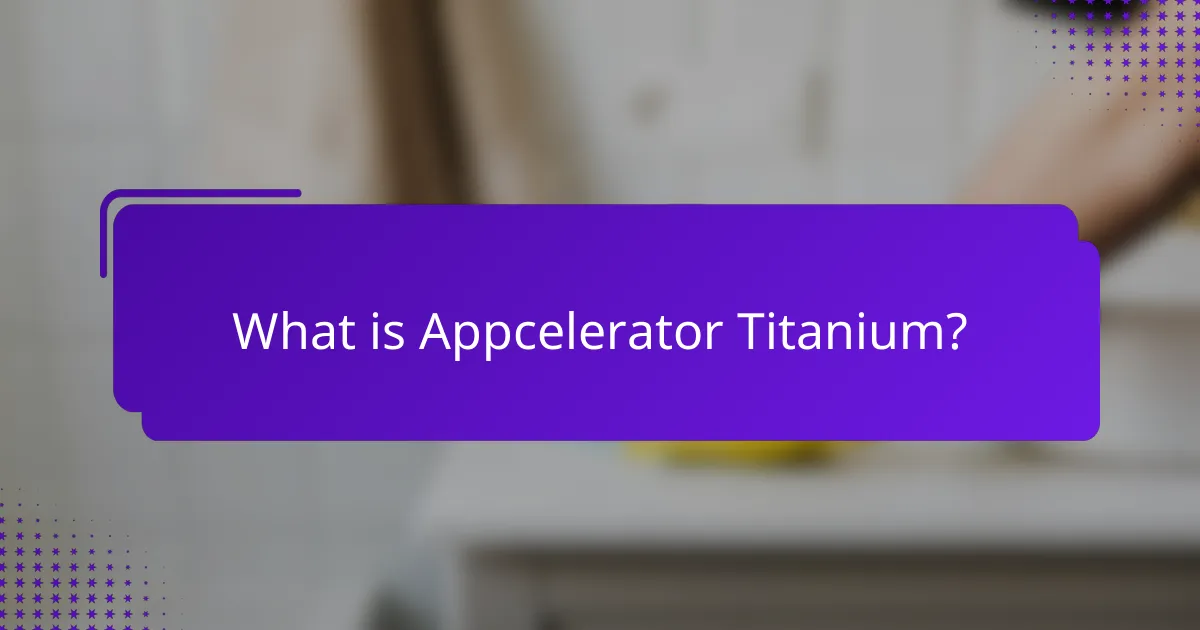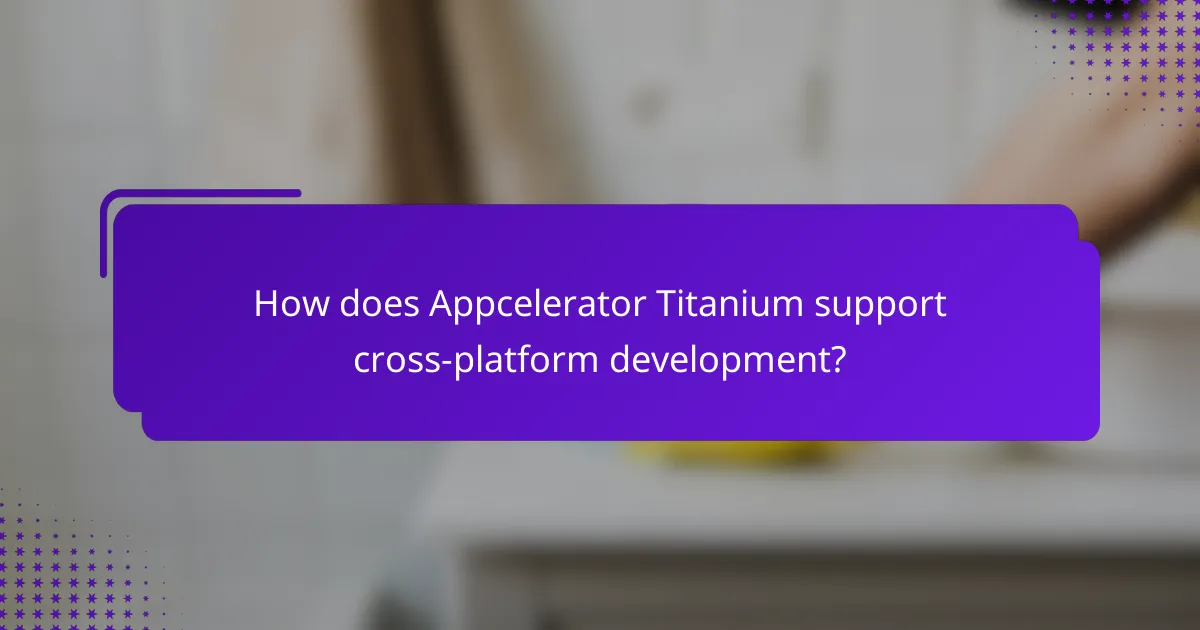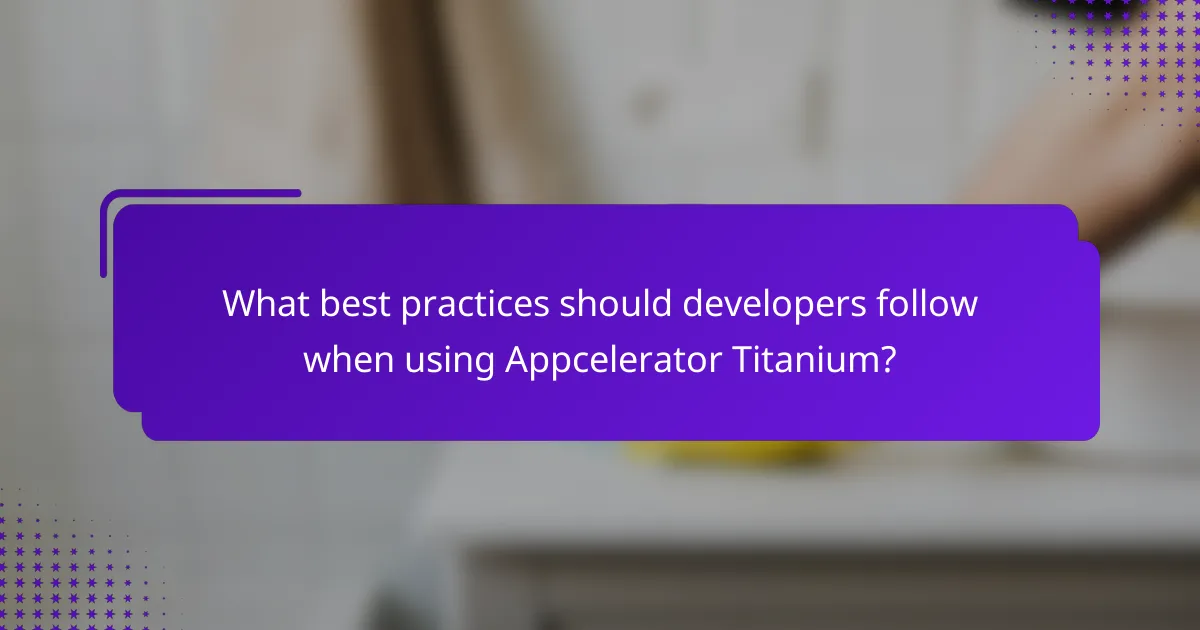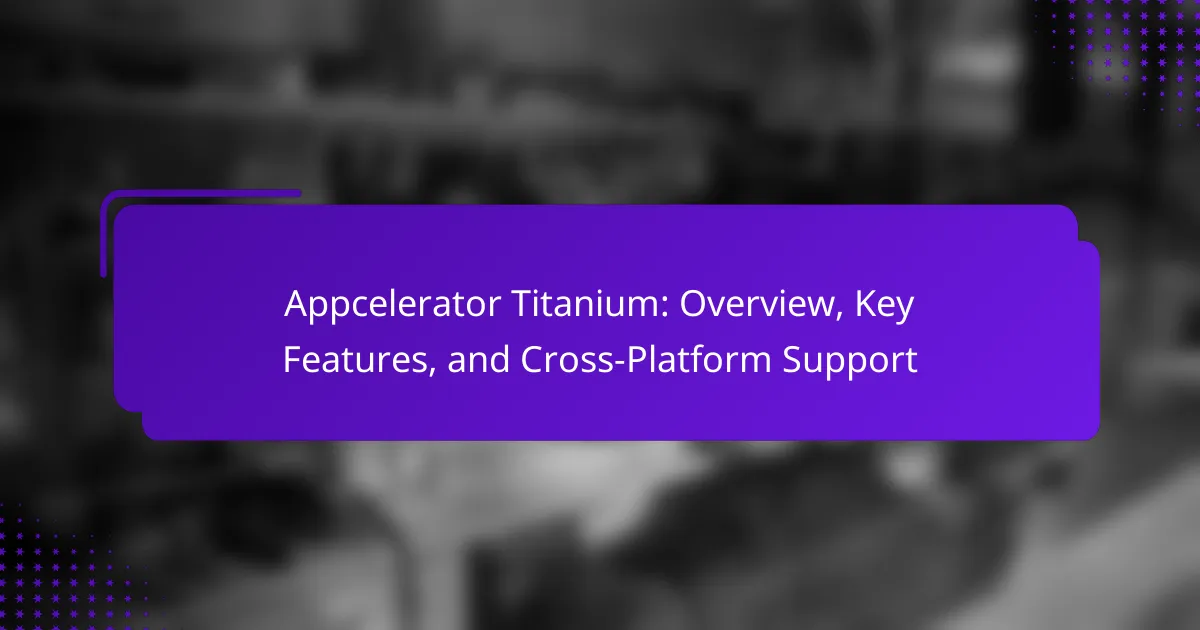Appcelerator Titanium is an open-source framework designed for building cross-platform mobile applications using JavaScript. It enables developers to create native applications for iOS, Android, and Windows by compiling JavaScript code into native code, significantly reducing development time and costs. The framework offers a comprehensive set of APIs and tools that facilitate access to device features such as camera, GPS, and accelerometer functionalities. Additionally, Appcelerator Titanium supports rapid application development, real-time updates, and provides best practices for efficient coding, including the use of MVC architecture and built-in modules. This article will explore the key features of Appcelerator Titanium and its capabilities in enhancing cross-platform mobile development.

What is Appcelerator Titanium?
Appcelerator Titanium is an open-source framework for building cross-platform mobile applications. It allows developers to create native mobile apps using JavaScript. Titanium provides a rich set of APIs and tools for accessing device features. This includes camera, GPS, and accelerometer functionalities. The framework compiles JavaScript code into native code for both iOS and Android platforms. Appcelerator Titanium supports rapid development and deployment of applications. It has been used by thousands of developers worldwide to streamline the app development process. The framework enhances productivity through its modular architecture and extensive library of components.
How does Appcelerator Titanium function as a development tool?
Appcelerator Titanium functions as a development tool by enabling developers to create cross-platform mobile applications using a single codebase. It utilizes JavaScript for application development, which simplifies the process for web developers. Titanium provides a rich set of APIs that allow access to native device features like camera, GPS, and notifications. This access is achieved through a framework that translates JavaScript code into native code for iOS and Android platforms. Additionally, Titanium includes a cloud service for backend support, facilitating data storage and user management. It also offers a visual development environment, which enhances productivity by allowing real-time previews of applications. Overall, Appcelerator Titanium streamlines the mobile app development process, making it efficient and cost-effective for developers.
What programming languages does Appcelerator Titanium support?
Appcelerator Titanium supports JavaScript as its primary programming language. It allows developers to write applications using JavaScript, which is then compiled to native code for various platforms. Additionally, Titanium supports XML for defining user interface layouts. This combination enables a streamlined development process for cross-platform mobile applications.
What are the core components of Appcelerator Titanium?
The core components of Appcelerator Titanium include the Titanium SDK, Alloy framework, and Appcelerator Cloud Services. The Titanium SDK provides the essential tools for building mobile applications across platforms. The Alloy framework offers an MVC architecture, facilitating the development process. Appcelerator Cloud Services enables backend functionality such as user management and data storage. These components work together to streamline cross-platform app development.
What are the key features of Appcelerator Titanium?
Appcelerator Titanium offers several key features for mobile app development. It enables cross-platform development using a single JavaScript codebase. This reduces development time and costs significantly. Titanium provides access to native APIs, ensuring high performance and a native look and feel. It supports a wide range of devices and operating systems, including iOS and Android. The platform includes a rich set of UI components for building responsive user interfaces. Additionally, it features a cloud service for backend support, facilitating easier data management. Appcelerator Titanium also offers analytics tools to track app performance and user engagement. These features collectively enhance the efficiency and effectiveness of mobile app development.
How does Appcelerator Titanium enable rapid application development?
Appcelerator Titanium enables rapid application development through its JavaScript-based framework. This allows developers to write code once and deploy it across multiple platforms. The framework provides a rich set of pre-built UI components. These components streamline the design process and reduce development time. Titanium also includes a powerful API for accessing native device features. This functionality minimizes the need for extensive native coding. Additionally, its cloud services facilitate backend integration, further speeding up development. Overall, Titanium’s cross-platform capabilities and extensive libraries enhance efficiency in app creation.
What tools and libraries are included in Appcelerator Titanium?
Appcelerator Titanium includes several tools and libraries essential for mobile app development. The core components are the Titanium SDK, Alloy framework, and Appcelerator CLI. The Titanium SDK provides a robust set of APIs for building native mobile applications. Alloy is a model-view-controller (MVC) framework that enhances the development process with better code organization. Appcelerator CLI offers command-line tools for project management and builds. Additionally, it includes modules for accessing native device features like camera and GPS. These tools collectively streamline the development workflow and enhance cross-platform capabilities.
What are the advantages of using Appcelerator Titanium for cross-platform development?
Appcelerator Titanium offers several advantages for cross-platform development. It enables developers to write code once and deploy it across multiple platforms, including iOS and Android. This significantly reduces development time and costs. The framework uses a single JavaScript codebase, simplifying maintenance and updates. Appcelerator Titanium provides access to native APIs, ensuring high performance and a native look and feel. Its rich set of pre-built modules accelerates the development process. Additionally, it supports real-time analytics, allowing developers to track app performance and user engagement effectively. These features make Appcelerator Titanium a powerful choice for efficient cross-platform app development.
How does Appcelerator Titanium ensure consistent performance across platforms?
Appcelerator Titanium ensures consistent performance across platforms by using a single JavaScript codebase. This codebase is compiled into native applications for iOS, Android, and other platforms. The framework provides access to native APIs, enabling efficient interactions with device features. It uses a cross-platform architecture that minimizes platform-specific code. This approach reduces redundancy and enhances maintainability. Additionally, Titanium’s SDK includes performance optimizations. These optimizations ensure that applications run smoothly on all supported devices. The use of native components contributes to a seamless user experience across platforms.
What are the cost benefits of using Appcelerator Titanium for development?
Appcelerator Titanium reduces development costs by enabling cross-platform app creation from a single codebase. This approach minimizes the time and resources needed for separate iOS and Android development. Developers can leverage JavaScript, a widely-used language, which lowers hiring costs and training expenses. Additionally, Titanium’s extensive library of pre-built modules accelerates the development process, further reducing costs. According to a study by Forrester Research, companies using cross-platform solutions like Titanium can save up to 30% on development costs compared to native development. This efficiency translates into faster time-to-market and improved return on investment.

How does Appcelerator Titanium support cross-platform development?
Appcelerator Titanium supports cross-platform development by allowing developers to write a single codebase that runs on multiple platforms. It uses JavaScript as the primary programming language, which is widely known and accessible. Titanium compiles this code into native applications for iOS, Android, and Windows. This approach reduces development time and costs significantly.
Additionally, Titanium provides a rich set of APIs and modules that enable access to native device features. Developers can utilize UI components that adapt to different platforms seamlessly. Appcelerator’s platform supports real-time app updates, further enhancing the cross-platform experience. According to Appcelerator’s documentation, this framework enables faster deployment and easier maintenance of applications across various devices.
What platforms can be targeted using Appcelerator Titanium?
Appcelerator Titanium can target multiple platforms including iOS, Android, and Windows. It allows developers to create native applications using a single JavaScript codebase. This cross-platform capability streamlines the development process. Appcelerator Titanium utilizes native APIs to ensure performance and user experience. According to the official documentation, it supports both mobile and desktop environments. This versatility makes it a popular choice among developers.
How does Appcelerator Titanium handle platform-specific functionalities?
Appcelerator Titanium handles platform-specific functionalities through a unified API that abstracts native features. This allows developers to write code once and deploy it across multiple platforms. Titanium provides platform-specific modules that enable access to native device capabilities. For instance, it offers specific APIs for iOS and Android to utilize their unique functionalities. Additionally, developers can implement conditional statements to execute platform-specific code when necessary. This flexibility ensures that applications can leverage the strengths of each platform effectively. The use of JavaScript for development further simplifies the process, as it allows for easy integration with native code when needed.
What is the significance of a single codebase in Appcelerator Titanium?
A single codebase in Appcelerator Titanium allows developers to write one set of code that runs on multiple platforms. This approach significantly reduces development time and costs. It streamlines the maintenance process because updates only need to be made once. A single codebase also ensures consistency in user experience across different devices. According to Appcelerator’s documentation, this method enhances productivity by enabling faster iterations. Overall, the significance lies in efficiency and resource optimization.
What challenges might developers face when using Appcelerator Titanium?
Developers might face several challenges when using Appcelerator Titanium. One significant challenge is the learning curve associated with its unique architecture. Understanding the Alloy framework can be difficult for new users. Additionally, performance issues may arise when apps are not optimized properly. This can lead to slower load times and less responsive user interfaces.
Another challenge is limited access to native APIs. While Titanium supports many native features, some advanced functionalities may not be available. Developers may need to write custom modules to access these features, which can be time-consuming.
Moreover, debugging can be complex due to the abstraction layer. This makes it harder to trace errors back to the source. Finally, the community support is not as extensive as that of other frameworks. This can hinder problem-solving and access to resources.
What are common performance issues in Appcelerator Titanium applications?
Common performance issues in Appcelerator Titanium applications include slow rendering, memory leaks, and inefficient API calls. Slow rendering often occurs due to heavy UI components or excessive use of animations. Memory leaks can arise from improper handling of event listeners or objects that are not properly disposed of. Inefficient API calls may result from synchronous requests or poorly optimized backend interactions. These issues can lead to poor user experiences, such as lagging interfaces or crashes. Addressing these problems typically requires profiling the application and optimizing the code.
How can developers troubleshoot cross-platform compatibility in Appcelerator Titanium?
Developers can troubleshoot cross-platform compatibility in Appcelerator Titanium by using the built-in tools provided by the framework. They should first utilize the Titanium CLI to check for platform-specific issues. Running the app on different simulators can reveal discrepancies in behavior.
Reviewing the logs generated during the app’s execution helps identify runtime errors. Developers should also verify that they are using the latest version of Titanium SDK, as updates often fix compatibility issues.
Testing on actual devices is crucial, as simulators may not accurately reflect real-world performance. Utilizing the Appcelerator community forums can provide insights from other developers who have faced similar challenges.
Documentation available on the Appcelerator website offers guidelines for specific platform requirements and best practices. By following these steps, developers can effectively address compatibility issues across platforms.

What best practices should developers follow when using Appcelerator Titanium?
Developers should follow several best practices when using Appcelerator Titanium. First, they should utilize the MVC (Model-View-Controller) architecture for better code organization. This approach separates application logic, data, and UI components, making it easier to manage and scale the application.
Second, developers should leverage built-in modules and APIs to enhance functionality. Appcelerator provides numerous modules that can reduce development time and improve performance. Third, optimizing images and assets is crucial. Using appropriately sized images can significantly enhance app performance and reduce load times.
Additionally, developers should implement error handling and logging to identify issues quickly. This practice aids in debugging and ensures a smoother user experience. Testing on multiple devices is also important. Appcelerator supports cross-platform development, so testing on various devices ensures compatibility.
Finally, keeping the SDK updated is essential. Regular updates from Appcelerator include bug fixes and new features, which can improve the overall application quality. Following these best practices can lead to more efficient development and a better end product.
How can developers optimize their applications built with Appcelerator Titanium?
Developers can optimize their applications built with Appcelerator Titanium by following best practices for performance and resource management. They should minimize the use of heavy libraries and frameworks that can increase load times. Using native modules can enhance performance by offloading heavy tasks to the device’s native capabilities. Developers should also leverage the Titanium SDK’s built-in features, such as asynchronous programming, to improve responsiveness.
Profiling tools available in the Appcelerator Studio can help identify performance bottlenecks. Reducing the number of UI elements on screen can also enhance performance. Additionally, optimizing images and other assets for size and resolution can significantly decrease loading times. Developers should regularly update their SDK to benefit from performance improvements and new features.
What are the recommended coding standards for Appcelerator Titanium projects?
Recommended coding standards for Appcelerator Titanium projects include maintaining consistent indentation and using camelCase for variable names. Developers should comment their code for clarity and use meaningful names for functions and variables. Adhering to a modular structure is essential for maintainability. Utilizing the latest version of Titanium SDK ensures access to the latest features and fixes. Following these standards enhances code readability and collaboration among team members. Consistent practices lead to fewer bugs and easier debugging. These guidelines are widely accepted in the Appcelerator community for effective project management.
How can developers effectively utilize the community and resources for Appcelerator Titanium?
Developers can effectively utilize the community and resources for Appcelerator Titanium by actively engaging in forums and discussion groups. Platforms like the Appcelerator Community Forum provide a space for developers to ask questions and share knowledge. Participating in these discussions fosters collaboration and helps solve common issues.
Additionally, developers should leverage the official documentation and tutorials available on the Appcelerator website. This resource offers comprehensive guides and best practices for using Titanium. Following these resources can enhance understanding and improve development efficiency.
Moreover, joining social media groups and attending webinars can provide real-time support and updates from fellow developers. Networking with others in the community can lead to valuable insights and opportunities for collaboration.
Lastly, contributing to open-source projects related to Appcelerator Titanium can deepen expertise and showcase skills to potential employers. Engaging with the community through contributions strengthens the overall ecosystem and promotes shared learning.
Appcelerator Titanium is an open-source framework designed for building cross-platform mobile applications using JavaScript. This article provides a comprehensive overview of Titanium’s key features, including its ability to streamline development through a single codebase, access to native device functionalities, and support for rapid application deployment. It also discusses the core components of the framework, such as the Titanium SDK and Alloy framework, as well as the advantages and challenges developers may face when utilizing Appcelerator Titanium. Additionally, best practices for optimizing applications and leveraging community resources are outlined to enhance the development experience.
